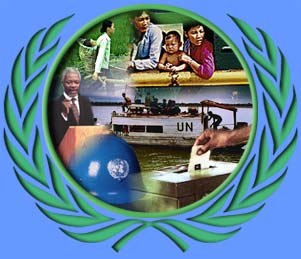
Ambassador Shirin Tahir-Kheli
Head of U.S. Delegation, U.N. Commission on Human Rights
Item 9: Question of the Violation of Human Rights and Fundamental Freedoms
In Any Part of the World
March 30, 2001
Mr. Chairman:
The past year a number of countries have taken important steps to improve the human rights conditions facing their own citizens. Such steps are not always easy to take, nor sufficiently appreciated by the international community, so I would like to begin my remarks today by commenting on a few of the more notable achievements.
[...]
At the same time, Mr. Chairman, there are a number of countries where universal human rights and fundamental freedoms are neither enjoyed nor respected. The United States is sometimes criticized for speaking frankly here about these cases, as if the Commission on Human Rights were an improper place to speak of human rights and the countries that abuse them. But if not here, where? If not now, when? We are here to promote human rights, and we cannot do that unless we first critically assess genuine problems.
And the truth is that while we all may speak the language of human rights here in Geneva, there are vast differences in the way countries deal at home with individuals who seek their universal human rights. As members of the Commission, therefore, we see it as our duty to help give voice to the voiceless and hope to the hopeless. In doing so, we recognize those who have risked their lives and fortunes for the cause of human rights, [...] These are but a few of the people, who are suffering for their beliefs today, victims of governments that refuse to abide by their international human rights obligations. Sadly, there are millions more like them, men and women whose names we may not know so well, but who suffer torture, jail and even death for simply speaking out in public, advocating free elections, publishing a newspaper, practicing religion, or organizing trade unions or civic associations.
We all recognize that China has substantially liberalized important sectors of its economy in recent years, and that this has resulted in dramatic improvements in people's daily lives. We welcome the country's increasing prosperity and the atmosphere of greater personal freedom enjoyed by the Chinese people as a whole. But the truth of the matter is that China has numerous human rights problems and that its already poor human rights record worsened the last year, particularly with respect to religious minorities, and the Tibetan people. The government also continues to suppress any person or group it perceives as a threat. We seek no blanket condemnation of China. But we must address human rights abuses that contradict international norms. By speaking out the Commission can best serve the cause of human rights and fundamental freedoms. It should not be silent when the Chinese authorities demolish Christian churches and Buddhist temples and brutally repress Falun Gong practitioners exercising rights to freedom of belief and expression. It should not be silent when those who call for democratic government or more cultural preservation and religious freedom in Tibet and elsewhere in China are suppressed or when advocates of labor rights are thrown in jail.
The Chinese government continues to detain up to 1,000 people for "counter-revolution," a crime which was taken off the books in 1997. Hundreds of others remain imprisoned under the State Security Law, while thousands are sentenced, without trial, in reform-through-labor camps. And what are their crimes, Mr. Chairman? None save a desire to experience the human rights that belong to everybody, everywhere: freedom of association, expression, assembly, religion, conscience, and belief.
[...]
Mr. Chairman, Americans speak from over 200 years of experience when we express our concern whenever fundamental liberties are suppressed. The United States has fought the battle for human rights and the dignity of humankind both at home and abroad, in war and in peace. In closing, I am proud to say that ours is a country with global interests and a deep and abiding concern for the promotion of universal human rights in every country of the world, including our own. We look forward, therefore, to speaking out on these concerns and other country situations later in this session.
Thank you.
Category: Voices of Support Worldwide



